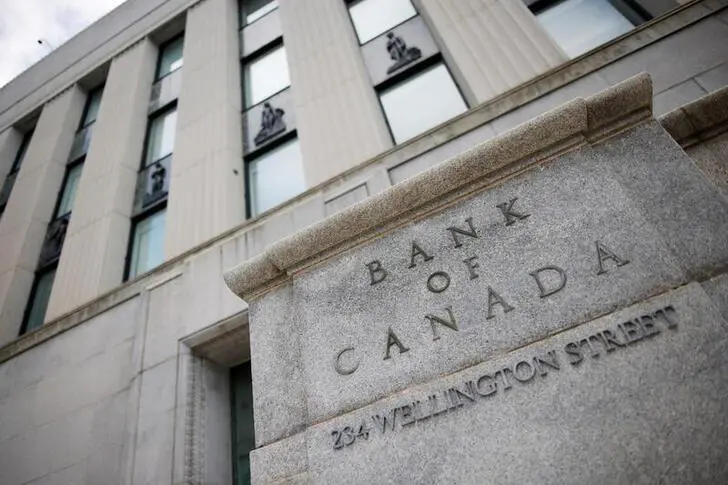PHOTO
The Bank of Canada is likely to increase interest rates for a second consecutive meeting, bringing borrowing costs to a level not seen in 22 years. Economists and markets expect Governor Tiff Macklem and his officials to raise the benchmark overnight rate to 5% today in Ottawa. Most major commercial lenders in Canada predict the hike will be the last in this cycle.
Policymakers aren’t likely to explicitly signal that they’re finished. Instead, they may be inclined to leave the threat of more hikes on the table as they assess how the economy is absorbing higher interest payments. That would also avoid a replay of January, when they paused and triggered a wave a market speculation about rate cuts.
“They have to sound credibly hawkish,” Benjamin Reitzes, a rates and macro strategist at Bank of Montreal, said by phone. “The door has to stay open for more — they can’t risk a repeat of the post-January move in markets and housing.”
The bank’s declaration of a conditional pause on January 25 seemed to suggest Macklem was comfortable winding down his hiking cycle. Most economists assumed Canada’s highly indebted households had been pinched enough to slow their spending, cooling the economy and inflation pressures.
The country’s housing market quickly rebounded, however, fuelling consumer confidence as many Canadians thought the central bank was done raising rates. Traders in overnight swaps started to increase their bets that cuts would come by the end of the year. In June, the Bank of Canada pivoted, upending markets when it moved from the sidelines to boost rates again.
Strong consumption data led economists to rethink households’ sensitivity to higher borrowing costs. Part of Macklem’s task today will be to explain why the economy hasn’t been more affected by elevated rates.
He’s not alone in facing that challenge. Officials at the Federal Reserve are saying US rates will need to go higher. The European Central Bank isn’t done hiking yet, and Bank of England policy is becoming a national obsession in the UK.
Yet risks are mounting as rates push deeper into restrictive territory, increasing the likelihood of a recession. While the timing has been pushed back, economists in Bloomberg’s latest monthly Canada survey still expect two quarters of negative growth in the second half of the year. Though wage pressures have come off the boil, inflation expectations are still too elevated. Canada’s jobs market also continues to run hot.
Despite cooling in recent months due to base effects and falling gasoline prices, headline annual inflation of remains too high at 3.4%. A closely watched three-month moving average of the central bank’s preferred core measures is stuck at 3.7%, a level inconsistent with a timely return to price stability.
“They’re not going to be laissez-faire and sit on the sidelines while core inflation isn’t trending materially lower,” Carrie Freestone, an economist with the Royal Bank of Canada, said by phone.
© Gulf Times Newspaper 2022 Provided by SyndiGate Media Inc. (Syndigate.info).Policymakers aren’t likely to explicitly signal that they’re finished. Instead, they may be inclined to leave the threat of more hikes on the table as they assess how the economy is absorbing higher interest payments. That would also avoid a replay of January, when they paused and triggered a wave a market speculation about rate cuts.
“They have to sound credibly hawkish,” Benjamin Reitzes, a rates and macro strategist at Bank of Montreal, said by phone. “The door has to stay open for more — they can’t risk a repeat of the post-January move in markets and housing.”
The bank’s declaration of a conditional pause on January 25 seemed to suggest Macklem was comfortable winding down his hiking cycle. Most economists assumed Canada’s highly indebted households had been pinched enough to slow their spending, cooling the economy and inflation pressures.
The country’s housing market quickly rebounded, however, fuelling consumer confidence as many Canadians thought the central bank was done raising rates. Traders in overnight swaps started to increase their bets that cuts would come by the end of the year. In June, the Bank of Canada pivoted, upending markets when it moved from the sidelines to boost rates again.
Strong consumption data led economists to rethink households’ sensitivity to higher borrowing costs. Part of Macklem’s task today will be to explain why the economy hasn’t been more affected by elevated rates.
He’s not alone in facing that challenge. Officials at the Federal Reserve are saying US rates will need to go higher. The European Central Bank isn’t done hiking yet, and Bank of England policy is becoming a national obsession in the UK.
Yet risks are mounting as rates push deeper into restrictive territory, increasing the likelihood of a recession. While the timing has been pushed back, economists in Bloomberg’s latest monthly Canada survey still expect two quarters of negative growth in the second half of the year. Though wage pressures have come off the boil, inflation expectations are still too elevated. Canada’s jobs market also continues to run hot.
Despite cooling in recent months due to base effects and falling gasoline prices, headline annual inflation of remains too high at 3.4%. A closely watched three-month moving average of the central bank’s preferred core measures is stuck at 3.7%, a level inconsistent with a timely return to price stability.
“They’re not going to be laissez-faire and sit on the sidelines while core inflation isn’t trending materially lower,” Carrie Freestone, an economist with the Royal Bank of Canada, said by phone.





















